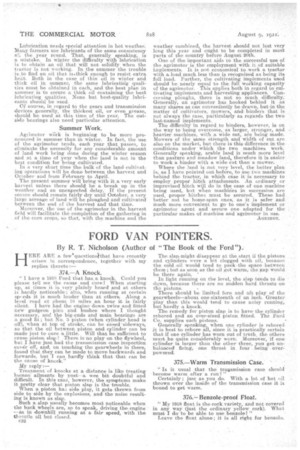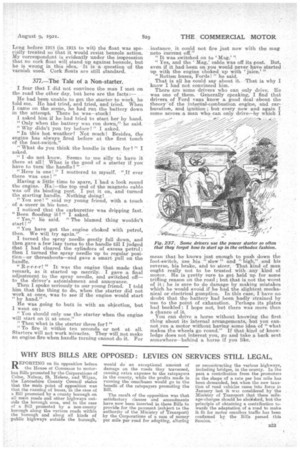FORD VAN POINTERS.
Page 28

Page 29

If you've noticed an error in this article please click here to report it so we can fix it.
By R. T. Nicholson (Author
HERE ARE a few4question4that have recently arisen in correspondence, together with my replies thereto:— 374.—A Knock. . "1 ha,ve a 1918 Ford that has.a knock. Could you please tell me the cause, and cure? When starting up, at time's it is very plainly heard' and at others is hardly noticeable; also, when running at certain el:weds it is much louder than at others. Along a level road at about 18 miles an hour it. is fairly silent. I have had the engine down twice and fitted new gudgeon pins and bushes. where I thought necessary, and the big-ends and main bearings are a good fit ; but No, ',), piston (when cylinder head is off), when at top of stroke, can be eased' sideways, so that the oil between piston and cylinder can be made just to ooze: a little. Will that be sufficient to cause piston slap'? There is no play -on theflywheel, but I have just had the transmission case inspectibn co‘e.-aoff, and, 'on touching the gearwheelsin there, found that they can be made, to move backwards and forwards, but I can hardly think that that can be -the cause of kneck."
My reply:—
Treatment of knoaks at a distance is like treating human' ailments by pc-ist—a wee bit doubtful and difficult. In this case, however, the symptoms make it pretty clear that piston slap is the trouble.
When a piston ha, side play, it gets thrown from side to side by the explosions, and the noise resulting is known as slap.
Such a slap usually becomes most noticeable when the back wheels are, so to speak, driving the, engine'—as in downhill running at a fair speed, with the throttle all but closed.
The slan-might disappear at the-start ii the pistons and cylinders were a bit clogged witth, oil, because the cold ,oil would tend to pack-the space -between them ; but as soon as the nil got warm, the gap would be there again, '
In light running on the level, the slap tends to die down, because there are no sudden hard thrusts-on the pistons. • There shouldL be limited fore and aft play of the gearwheels—about one-sixteenth of an inch. Greater play than this would tend to cause noisy running, but hardly a knock.
The remedy for piston slap is to have the cylinder rebored, and an over-sized piston fitted. The Ford Co. supplies such pistons.
Generally speaking, when one cylinder is rebored it is best torebore all, since it is practically certain that if one cylinder has worn out of truth, the Others must be quite considerably worn: Moreover, if one cylinder is larger than the other three, you get unbalanced firing, one thrust in four being overpowered:
375.—Warm Transmission Case.
" Is it usual that the transmission case should become warm after a run? "
Certainly ; just. as you do:. With a lot of hot oil thrown over the inside of the transmission case it is bound to get warm.
Benzole-proof Float.
"My 1918 float is the cork variety, and not covered in any way (just the ordinary yellow cork). What must I de' • to be able to use b•e:nzole? "
Leave the float alone; it is all right for benzole.
Long before 1919 (in 1915 to wit) the float was specially treated so that it would resist benzole action. My correspondent is evidently under the impression that no cork float will stand-up against benzole, but he is wrong in this idea. It is a question of the varnish used. Cork floats are still standard.
377.—The Tale of a Non-starter.
I fear that I did not convince the man I met on the road the other day, but here are the facts:—
Ho had been unable to get the starter to work he told me. Ile had tried, and tried, and tried. When I came on the scene, he had run the battery down in the attempt. There he was—stuckl I asked hint if he had tried to start her by hand. "Only when the battery was run down," he said. "Why didn't you try before"? " I asked.
"In this hot weather? Not much! Besides, the engine has always fired, before at the first touch of the foot-switch."
"17Vhat do you think the handle is there for?" I asked.
"I -do. not know. Seems to me silly to have it there at all! What, is the good of a starter if you have to turn thehandle? "
" Here is one " I muttered to myself. " jf ever there was one " Having a little time to spare, I had a look round the engine. Hal—the top end of the magneto cable was off its binding post. I put it on, and turned the starting handle. Nothing doing! " You see!" said my young friend, with a touch of a sneer in his tone-.
I noticed that the carburetter was dripping fast. "Been flooding it?" I asked.
"Yes," he said. "The blamed thing wouldn't start! "
"You have got thechoked with petrol,
then. We will try agan.'
I turned the spray needle gently full down, and then gave a few lazy turns to the handle till I judged that I had cleared the cylinders of excess petrol: then I turned the spray needle, up to regular position—or thereabouts—and gave a smart pull on the handle.
" R-r-r-r-rl " It was the engine that made that remark, as it started up merrily. I gave a final adjustment to the spray needle, and switched off— to the driver's astonishment and annoyance. Then I spoke seriously to our young friend. I told him that the thing to do, when the starter did not work at once, svas to see if the engine would start "by hand."
He was going to butt in with an objection, but I went on: "You should only use the starter when the engine will start on it at once."
" Then what is the starter there for ? "
"To fire it within ten seconds or not at all. Starters will not work miracles. They will, not make an engine fire when handle turning cannot do it. For instance, it could not fire just now with the mag neto current off."
"It was switched on to Mag."' "Yes, and the Mag.' cable was off its post. But, even if it had been on you would never have started up with the engine choked up with 'juice.'" "Rotten buses, Fords!" he said. That is all he could say about it. That is why I know I had not convinced him.
There are some drivers who can only drive. He was one of them. Generally speaking, I find that drivers of Ford vans know a good deal about the theory of the internal-combustion engine, and carburation, and ignition ; but every now and again I come across a man who. can only drive—by which I
mean that he knows just enough to push down the foot-switch, use his " slow " and "high,," and his reverse, his brake, and to steer. That kind of man ought really. not to he trusted with any kind of motor. He is pretty sure to get held up for some trifling reason on the road ; but that is not the worst of it; he is sure to do damage by making mistakes which he would avoid if he had, the slightest mechanical or electrical gumption. In this ease, I have no doubt that the battery had been badly strained by use to the point of exhaustion. Perhaps its plates had buckled ; I hope not, but there was more than a chance of it.
You can drive a horse without knowing the first thing about its internal arrangements, but you cannot run a motor without having some idea of "what makes the wheels go round." If that kind of knowledge does not interest you, go and take a back seat somewhere—behind a horse if you like.
































